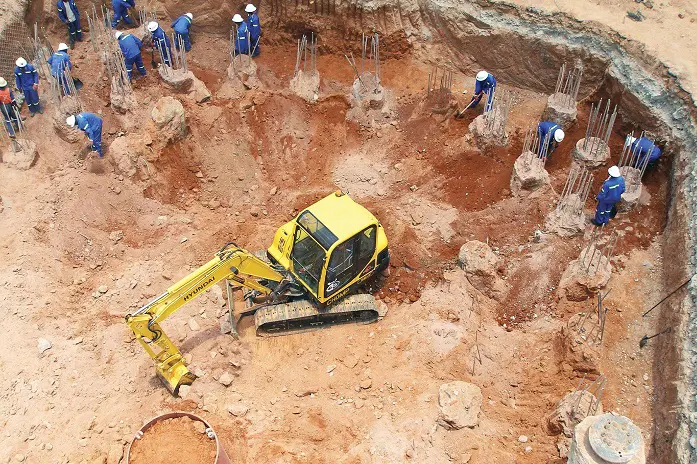Geotechnical Engineering What Is It and Why Is It Crucial for Building Projects?
Geotechnical Engineering What Is It and Why Is It Crucial for Building Projects?
Blog Article
A Thorough Overview of the Key Providers Used by Consulting Civil Engineering Professionals in Modern Building And Construction
Consulting civil design experts are important to the success of modern-day building and construction tasks, using a diverse collection of services that deal with different obstacles. geotechnical engineering in south africa. As the intricacy of construction tasks continues to evolve, understanding the full spectrum of solutions they give comes to be increasingly necessary for stakeholders.
Site Analysis and Expediency Research Studies
When starting any type of construction job, recognizing the site's attributes is crucial, as it directly affects the feasibility and layout of the advancement. Website evaluation and expediency researches are vital components of the pre-construction stage, allowing stakeholders to make informed decisions. These researches entail a thorough analysis of the physical, ecological, and governing facets of the website.

Expediency research studies expand beyond the physical features, encompassing social and economic considerations. This includes price price quotes, potential roi, and neighborhood impact evaluations. By incorporating these elements, civil design specialists can give a holistic sight of the website's viability for the designated development. Inevitably, complete website analyses and feasibility studies prepared for successful project execution, enhancing and reducing risks resource allotment.
Architectural Style and Analysis
Adhering to a comprehensive site evaluation and expediency research, the next critical phase in the building and construction process is architectural layout and analysis. This important solution includes the development of structural systems that make certain the security, toughness, and financial viability of a task. Consulting civil engineers use innovative methodologies and software to evaluate lots, stresses, and product buildings, making certain that styles adhere to appropriate codes and criteria.
Structural layout incorporates numerous elements, including beam of lights, columns, foundations, and bearing walls. By using principles of mechanics and product scientific research, engineers create structures that can endure ecological forces such as wind, seismic activity, and snow lots. The evaluation stage entails careful estimations to predict the habits of these frameworks under various conditions, guaranteeing they can carry out as meant throughout their lifespan.
Additionally, consulting designers work together carefully with engineers and other stakeholders to integrate structural components visually and functionally. The deliverables usually consist of in-depth illustrations, specs, and detailed records that promote the construction procedure. Eventually, effective structural layout and analysis are essential in minimizing dangers, optimizing resources, and accomplishing effective task end results in modern-day building.
Project Monitoring and Sychronisation
Reliable job monitoring and sychronisation are crucial parts of successful civil engineering services, ensuring that building projects are delivered in a timely manner, within budget plan, and to the required quality standards. Consulting civil designers play a vital duty in orchestrating different task elements, from preliminary planning via to forecast conclusion. This involves not just the technological elements of layout and construction but also the tactical management of stakeholders, timelines, and sources.

In addition, civil engineering professionals emphasize the value of paperwork and reporting throughout the job lifecycle - geotechnical engineering in south africa. By keeping accurate documents, they make certain openness and liability, which promotes trust fund among all celebrations entailed. Inevitably, skillful task monitoring and sychronisation lead to enhanced project results, lining up with client assumptions and adding to the overall success of the building and construction undertaking
Regulatory Conformity and Permitting
Effective project administration lays the foundation for dealing with regulative compliance and permitting demands in civil engineering tasks. Making certain adherence to neighborhood, state, and federal guidelines is crucial for the effective execution and completion of any type of building endeavor. Consulting civil design professionals play a crucial role in navigating the facility landscape of governing frameworks and permitting processes.
These professionals are skilled in zoning hop over to here legislations, developing codes, environmental regulations, and security requirements that regulate construction practices. They conduct comprehensive evaluations to identify all relevant guidelines, making certain that projects adhere to required lawful needs. By teaming up with governmental companies and stakeholders, seeking advice from designers facilitate the permitting process, simplifying approvals and reducing delays.
Furthermore, they prepare and send the requisite documentation, such as site plans, ecological impact evaluations, and engineering records. This proactive approach not only cultivates conformity but also improves project expediency and sustainability. Eventually, reliable regulatory compliance and allowing are vital parts of a successful civil design task, safeguarding both the setting and public welfare while contributing to the total honesty and success of building campaigns.
Sustainable Design Practices
Sustainable layout techniques are progressively acknowledged as essential parts in civil engineering, with a focus on minimizing ecological effect while taking full advantage of resource effectiveness. These practices encompass a variety of approaches intended at promoting environmental balance and decreasing the carbon footprint of building and construction tasks.
One trick element of sustainable style is the integration of renewable energy sources, such as solar and wind, into building styles. This not just minimizes reliance on nonrenewable fuel sources but additionally improves lasting expense financial savings. Furthermore, the usage of sustainable products, including recycled or swiftly eco-friendly sources, plays a substantial duty in minimizing waste and preserving natural sources.
Water management techniques, such as rainwater harvesting and reliable watering systems, are additionally crucial in sustainable design. These techniques help in minimizing water intake and securing neighborhood water ecosystems. In addition, ecologically delicate site planning makes certain marginal disruption to the natural landscape and advertises biodiversity.
Consulting civil engineering professionals contribute in applying these lasting style techniques. Their experience permits the implementation of ingenious options that line up with both regulative needs and client objectives, inevitably contributing to an extra sustainable built atmosphere.
Conclusion
In summary, seeking advice from civil engineering weblink specialists supply essential services that underpin the success of contemporary construction jobs. With precise site assessments, ingenious architectural design, effective job administration, adherence to governing standards, and the execution of sustainable practices, these experts contribute to the production of safe, effective, and ecologically responsible growths. The assimilation of these essential solutions not only enhances project outcomes however also advertises a sustainable future in the building sector.
Reliable task administration and control are essential elements of effective civil engineering services, ensuring that construction projects are delivered on time, within spending plan, and to the needed quality standards. Consulting civil designers play an essential function in orchestrating various visit the website task aspects, from initial planning through to predict conclusion. Ultimately, proficient job administration and sychronisation lead to enhanced job outcomes, straightening with customer expectations and contributing to the general success of the building and construction endeavor.

Report this page